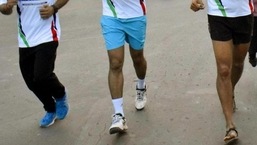Pakistan’s plan to trim its deficit by slashing spending may not be enough to convince the International Monetary Fund to resume its loan program, according to economists at Citigroup Inc.
Pakistan’s plan to trim its deficit by slashing spending may not be enough to convince the International Monetary Fund to resume its loan program, according to economists at Citigroup Inc.
The tax-to-GDP ratio is budgeted to rise to 9.2% of gross domestic product in the year starting July 1 from 8.6%, which seems low versus Pakistan’s emerging market peers and its own history, Johanna Chua and Gaurav Garg wrote in a note to clients Monday. Interest payments are estimated to consume about 44% of revenue.
Also read: On Prophet row, Pakistani social media handles spread maximum fake news: Report
“We await further fund feedback,” Chua and Garg wrote, before meetings due this month between IMF staff and Pakistani officials.
Pakistan is seeking an immediate disbursement of $900 million from the IMF, to help avert a potential default. Surging food and fuel prices have stoked Asia’s second-fastest inflation and debt repayments eroded Pakistan’s foreign-exchange reserves to below $10 billion as of June 3, or enough to cover less than two months of imports.
Also read: Taliban to act against Pak LeT/JeM terrorists in Afghanistan on specific intel
Pakistan needs at least $41 billion in the next 12 months, according to Finance Minister Miftah Ismail, which analysts including Saad Khan from IGI Securities Ltd. anticipate will be met but only barely.
-

-

Japan: What’s behind Okinawans’ falling life expectancy?
Medical experts and gerontologists have flocked to these semi-tropical islands off southern Japan in search of the secret to the local population’s longevity, with most concluding it was a combination of a nutritious diet, regular exercise and the support of family and the broader community.
-

Introducing complementary food to babies: Nutritionist shares tips
“When breast milk (or infant formula) alone is no longer sufficient for nutritional and developmental reasons, complementary food is required. Exclusive breastfeeding (only breast milk) is sufficient for a baby up to 6 months of age. Solid feeds that supplement breast milk, or complementary feeds, must be introduced gradually into the infant’s diet,” said Dr Latha Sashi.
-

-

Doctor tips on how to avoid stomach ailments in summer
“As temperature rises, summer invites various associated disorders like dehydration, indigestion, heartburn, constipation, acidity gastroenteritis, irritable bowel syndrome (IBS), diarrhoea, food poisoning and loss of appetite. Excessive heat makes digestive system slow and weak,” said Dr. R.C Soni.

